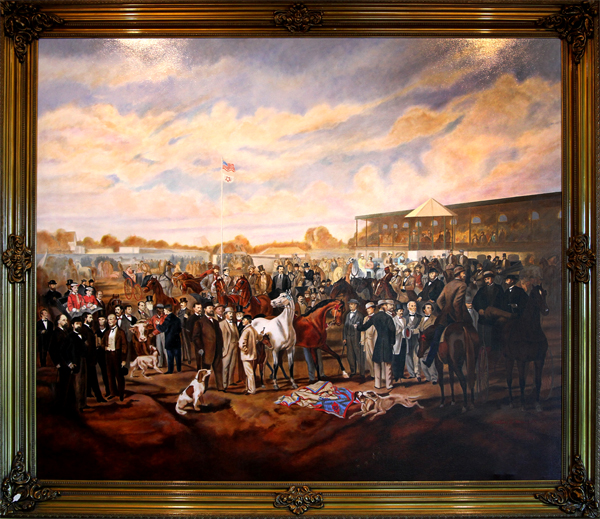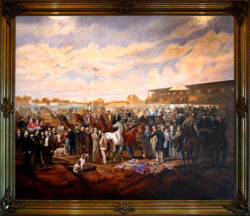Legalized Gambling
Legalized gambling has played an important cultural, political, and economic role in Louisiana's history from the colonial era to the present.

Fair Grounds Race Course and Slots.
A color reproduction of a painting by Theodore Sidney Moise entitled "Life on the Metairie."
Legalized gambling has played an important cultural, political, and economic role in Louisiana’s history from the colonial era to the present. Now part of the Louisiana landscape, gambling attracts tourists, provides jobs, and produces revenue—more than $723 million in direct revenue in fiscal year 2008–2009—but also threatens to attract corruption. Currently more than twenty casinos operate in the state, including thirteen on riverboats and four on racetracks. In addition, residents and visitors can play video poker in bars, restaurants, and truck stops throughout southern Louisiana. Casinos on tribal lands have also become an important source of income for many of the state’s Native Americans.
Gambling in Colonial and Antebellum Louisiana
French Louisianans built a number of cabarets and billiard halls in New Orleans, even before building a church. After the completion of the St. Louis Church in 1727 (now known as St. Louis Cathedral), some continued to gamble rather than attend mass. In the eighteenth century, Louisiana officials passed ordinances outlawing gambling and other activities considered vices during religious services, limited the pots for games of chance, and finally prohibited gambling all together. When none of these measures proved successful, Louisiana Governor Louis Billouart de Kerlérec opened a government-run casino in New Orleans in 1753. All efforts to curb gambling failed, and it remained prevalent decades after Spain took control of the colony following the French and Indian War (1754–1763).
In 1803, when Louisiana became a US territory, New Orleans had more places to gamble than New York, Philadelphia, Boston, and Baltimore combined. So entrenched was the practice that when the federal government banned gambling in the territory in 1812, it exempted New Orleans. After statehood, Louisiana swung back and forth between extremes—legalizing casinos and then banning them—though these efforts had a limited effect on the number of facilities. The state authorized six operations for New Orleans in 1823 and again legalized gambling in the city after the Civil War (1861–1865).
Legalized Gambling after the Civil War
In 1866, the state legislature created the first Louisiana lottery. Two years later this body, now controlled by officials elected under Radical Reconstruction, authorized a private corporation called the Louisiana State Lottery Company to operate it. This company paid a small annual fee but no state taxes. Opposed to this arrangement and upset with the corruption surrounding the lottery, Democrats in the Louisiana legislature passed a law in 1879 to abolish all lotteries. The lottery company quickly appealed, and the US Circuit Court forced the state to honor its contract with the corporation. The company took advantage of this second chance and worked to improve its image, enlisting ex-Confederate generals P. G. T. Beauregard and Jubal A. Early to advertise the lottery and conduct the public drawings. By doing so, the Louisiana Lottery Company hoped to imbue the lottery with a sense of legitimacy.
Following on the heels of this government sanction, the Louisiana Lottery Company enjoyed unprecedented profits. The company paid its stockholders dividends well over 100 percent between 1887 and 1890. It operated in almost every state in the country and garnered 90 percent of its sales outside of Louisiana. The company’s profits proved so substantial that it offered to pay a higher fee for its state license as part of its effort to renew the charter in 1890. But, in the late nineteenth century, the Louisiana Lottery Company faced serious opposition at both state and national levels. State governments, unhappy that their citizens spent money on Louisiana’s lottery, convinced President Benjamin Harrison to sponsor a law prohibiting lottery sales and advertising through the US Post Office. As a result, the value of Louisiana Lottery Company shares decreased dramatically. Meanwhile, opponents of the Louisiana lottery successful worked to elect anti-lottery governor Murphy Foster in 1892. The Louisiana legislature prohibited renewal of the lottery’s charter less than three years later.
Gambling in Twentieth-Century Louisiana
In the 1920s, legal pari-mutuel betting on horse races at the New Orleans Fair Grounds became the only officially sanctioned form of gambling in Louisiana. Illegal casinos continued to operate, however, as the state alternated between raiding these operations and ignoring them. Only the collapse of the state’s oil-based economy in the early 1980s prompted Governor Edwin Edwards in 1986 to promote the expansion of legalized gambling. Edwards proposed a special legislative session to create a state lottery and allow casinos in and around New Orleans. His initial efforts failed, and continuing to face budget shortfalls, he lost his reelection bid to Charles “Buddy” Roemer, a conservative Democrat who opposed a state lottery, as well as casinos.
Roemer proposed a tax reform plan to solve the state’s financial problems, but with the success of lotteries in Virginia and Florida, many citizens preferred a state lottery to increased personal and property taxes. The legislature put a referendum for a constitutional amendment that would allow a state lottery before the people in 1990. Governor Roemer remained neutral during the debate, Louisianans approved the amendment, and the lottery returned to the state in September 1991.
In addition to raising revenue, Louisiana lawmakers sought to end the flow of the state’s money to the Florida lottery and attract money from outside the state. With casinos authorized in nearby Mississippi in 1991, the promise of increased revenues, combined with the prospect of creating new jobs, convinced the legislature, with the support of Governor Roemer, to approve fifteen riverboat casinos: five in Shreveport-Bossier City, four in Lake Charles, three in New Orleans, and three in Baton Rouge. The same year, the governor allowed the legalization of video poker machines (which had operated illegally in bars and restaurants since the 1980s) to become law without his signature.
In 1991, campaigning in the gubernatorial primary, former governor Edwin Edwards initially promoted the construction of a land-based casino in New Orleans, claiming it would create 25,000 new jobs. However, in the runoff against former Ku Klux Klansman David Duke, Edwards agreed not to pursue the issue in an attempted to appease voters worried about corruption. Although Edwards initially kept his promise after taking office, he eventually guided legislation authorizing construction of a casino in the Crescent City.
Five years after Congress passed the Indian Gaming Regulatory Act in 1988, the three Native American tribes in Louisiana then recognized by the federal government—the Chitimachas, Coushattas, and Tunica-Biloxis—negotiated compacts with the state to open land-based casinos. After gaining recognition, the Jena, Louisiana Band of Choctaws also negotiated a compact with then governor Murphy Foster Jr., in 2002. The federal government approved the first agreements, and each of these tribes continues to operate a land-based casino. The Jena Band of Choctaws, however, never gained federal approval. Proposing a casino site near Lake Charles, the Jena faced opposition from both Texans and Coushattas, each fearing that the new casino would lure customers away from their establishments.
Legal gambling continued to expand as racetracks lobbied for slot machines. Their efforts eventually proved successful, and machines were installed at three tracks in 1997 and at a fourth track a few years later. Video poker also spread across the state as businesses took advantage of the legislature’s inclusion of “truck stops,” which it failed to clearly define.
As it did elsewhere, legal gambling sometimes led to corruption in Louisiana. Governor Edwards was convicted of accepting bribes to issue riverboat casino licenses and obtaining contracts for his children with the casino companies. The Federal Bureau of Investigation convicted members of organized crime families from both New York and New Orleans for their involvement in video poker in 1995, and in 2003, members of the Coushatta Tribe of Louisiana landed in the middle of the Jack Abramoff lobbying scandal. (Abramoff, a lobbyist, had been advising his clients—including the Coushattas—to hire public relations executive Mike Scanlon at an exorbitant rate; he then split the profits with Scanlon.) Despite the problems surrounding legalized gambling, however, the revenue produced for the state and the jobs tied to the industry mean it will likely continue as an important part of Louisiana’s culture and economy.
